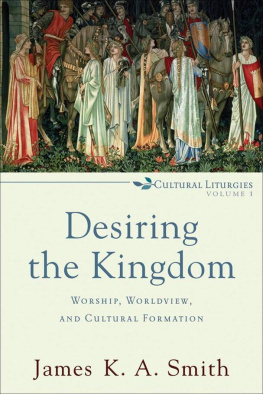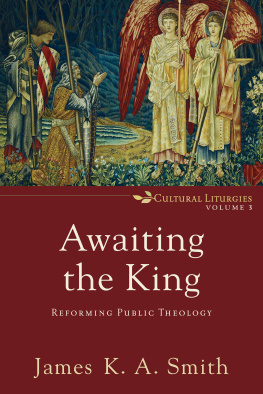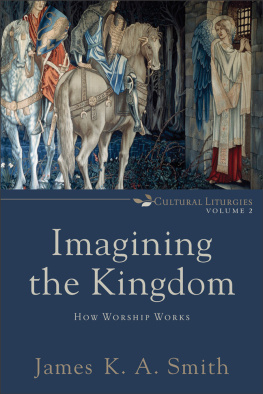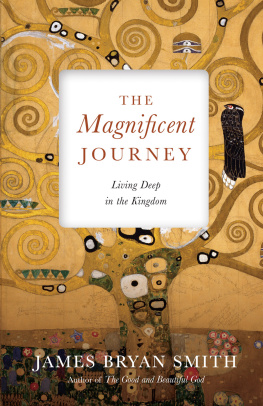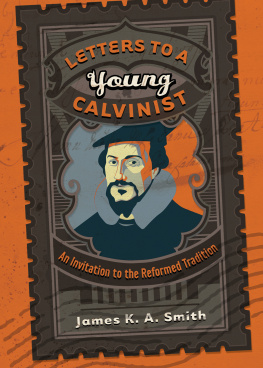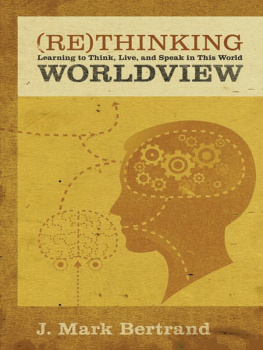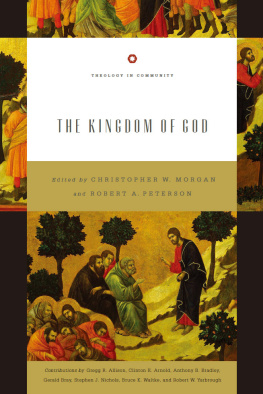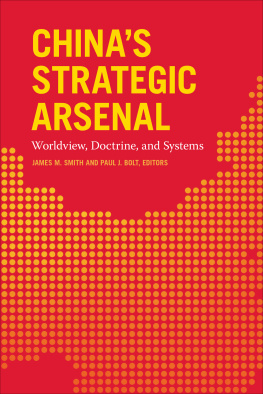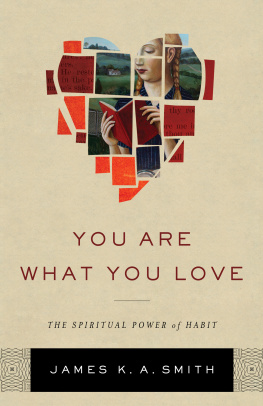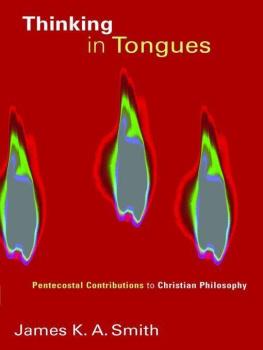
2009 by James K. A. Smith
Published by Baker Academic
a division of Baker Publishing Group
P.O. Box 6287, Grand Rapids, MI 49516-6287
www.bakeracademic.com
Ebook edition created 2013
All rights reserved. No part of this publication may be reproduced, stored in a retrieval system, or transmitted in any form or by any meansfor example, electronic, photocopy, recordingwithout the prior writte n permission of the publisher. The only exception is brief quotations in printed reviews.
ISBN 978-1-4412-1126-2
Library of Congress Cataloging-in-Publication Data is on file at the Library of Congress, Washington, DC.
Unless otherwise indicated, Scripture quotations are from the New Revised Standard Version of the Bible, copyright 1989, by the Division of Christian Education of the National Council of the Churches of Christ in the United States of America. Used by permission. All rights reserved.
Scripture quotations labeled NIV are from the HOLY BIBLE, NEW INTERNATIONAL VERSION. NIV. Copyright 1973, 1978, 1984 by International Bible Society. Used by permission of Zondervan. All rights reserved.
Scripture quotations labeled KJV are from the King James Version of the Bible.
The internet addresses, email addresses, and phone numbers in this book are accurate at the time of publication. They are provided as a resource. Baker Publishing Group does not endorse them or vouch for their content or permanence.
For Madison:
That little glint in your eye is,
for me,
a sure sign that the kingdom
is a kingdom of love.
Delight yourself in the L ORD ,
and he will give you the desires of your heart.
Psalm 37:4 NIV
Reason : I, Reason, am in minds as the power of looking is in the eyes. Having eyes is not the same thing as looking, and looking is not the same as seeing. The soul therefore needs three things: eyes which it can use aright, looking, and seeing. It is impossible to show God to a mind vitiated and sick. Only the healthy mind can see him. But if the mind does not believe that only thus will it attain vision, it will not seek healing. Even if it believes that this is true, and that only so will it attain the vision, but at the same time despairs of healing, will it not abandon the quest and refuse to obey the precepts of the physician?
Augustine : Most assuredly, especially because the disease must have sharp remedies.
Reason : So to faith must be added hope. [But] suppose it believes all this is true and hopes that healing is possible, but does not love and desire the promised light, and thinks it must be meantime content with its darkness which through habit has become pleasant, will it not, no less, spurn the physician?
Augustine : Perfectly true.
Reason : Therefore a third thing is necessary, love .
Augustine, Soliloquies 1.6.12
The boy sat tottering. The man watched him that he not topple into the flames. He kicked holes in the sand for the boys hips and shoulders where he would sleep and he sat holding him while he tousled his hair before the fire to dry it. All of this like some ancient anointing. So be it. Evoke the forms. Where youve nothing else construct ceremonies out of the air and breathe upon them.
Cormac McCarthy, The Road
Contents
Sidebars and Figures
Sidebars
Picturing This
To Think About
Figures
Preface
This book has a primary target, but its also hoping for some collateral impact. The genesis of the project was a desire to communicate to students (and faculty) a vision of what authentic, integral Christian learning looks like, emphasizing how learning is connected to worship and how, together, these constitute practices of formation and discipleship. Instead of focusing on what Christians think , distilling Christian faith into an intellectual summary formula (a worldview), this book focuses on what Christians do , articulating the shape of a Christian social imaginary as it is embedded in the practices of Christian worship. (Alexander Schmemanns For the Life of the World was an inspiring, working model herethough I dont pretend to have approached the compact majesty of that marvelous little book.) In short, the goal is to push down through worldview to worship as the matrix from which a Christian worldview is bornand to consider what that means for the task of Christian education and the shape of Christian worship. This doesnt require rejecting worldview-talk, only situating it in relation to Christian practices, particularly the practices of Christian worship. Thus I envision the book as a companion volume to classroom texts on worldview such as Walsh and Middletons Transforming Vision , Wolterss Creation Regained , or Plantingas Engaging Gods World .
As I was working on the project over the past several years and had opportunity to field-test the ideas in various contexts, it was suggested to me that the books argument might be of interest to a couple of further audiences. First, because it articulates the formative importance of worship and the vision of the world implicit in the practices of Christian worship, the book may be of interest to pastors, campus ministers, worship leaders, and others responsible for the shape of Christian worship in local congregations. It would be an honor and pleasure for me if this book could be a catalyst for inviting evangelical and Reformed communities to further intentional reflection on what we do as a people gathered by worship. Second, fellow scholars who heard or read early drafts of the project suggested that some of the issues and themes engaged here might also be breaking new ground and striking some new paths for Christian thought, and so might be of interest to scholars (philosophers, theologians, social scientists, and others). However, I didnt want to abandon the pedagogical intentions of the project and write a scholarly book. So scholars might read this volume as a prcis or abstract of a larger projecta bit of a promissory note.
I hope to keep those promises in two follow-up monographs that will constitute volumes 2 and 3 of Cultural Liturgies. The second volume will specifically focus on the philosophical anthropology sketched in chapters 1 and 2, with particular attention to the emerging dialogue between phenomenology, cognitive science, and social-scientific reflection on practiced formation. The third volume will address current debates in political theology, both in the particular orbit of the Reformed tradition (Mouw, Wolterstorff, and others) as well as the current debate between Jeffrey Stouts vision of a traditioned democracy and new traditionalist critiques of liberalism (MacIntyre, Hauerwas, Milbank). This first volume provides hints of the sorts of contributions I want to make to these discussions. But in order to keep the book focused on its core audience (students and teachers), I have kept these scholarly trajectories rather chastened, largely pushing those hints into footnotes.
Acknowledgments
This book owes its original impetus to the vision and energy of John Witvliet, director of the Calvin Institute of Christian Worship. As a liturgical theologian, John sensed and saw the importance of reconnecting worship and worldview and invited me to tackle the task. His prompting birthed an entire research agenda and was really an occasion for me to do some stocktaking of my work and its future, and to retool my interests in order to more intentionally let philosophical and theological reflection serve the church. He cant be blamed for what follows, but I am grateful for his catalytic vision. I am also grateful for a research grant from the Calvin Institute of Christian Worship in 20056, with funds from the Lilly Endowment, Inc., which got this project off the ground. I also owe a debt to Shirley Roels, director of the Lilly Vocation Project at Calvin College, for a course reduction while I was a Lilly Vocation Fellow in the same year. This was followed by a Vocation Venture Fund grant in fall 2007 that brought together some valued colleagues for a reading retreat focused on a first draft of this book. That group included Claudia Beversluis, Jeff Bouman, Ronald Feenstra, Shirley Roels, Kurt Schaefer, David Smith, Bill VanGroningen, and John Witvliet, to whom Im grateful for their time and insights.
Next page
